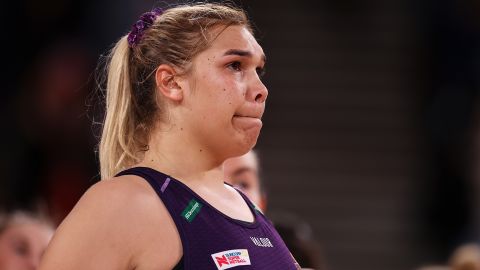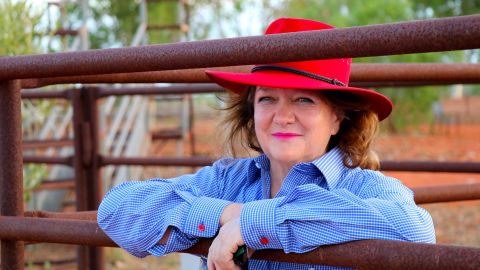[ad_1]
Brisbane, Australia
CNN
—
When Australia’s richest woman Gina Rinehart threw a financial lifeline to Netball Australia, she triggered a debate about sponsorships and the role of social and political issues in the sporting sphere. Then she walked away.
Rinehart’s bombshell decision to withdraw a 14 million Australian dollar ($8.9 million) sponsorship deal for the Diamonds, Australia’s national netball team, caught the players off-guard and struck a blow to the future of Netball Australia – a sporting body mired in debt.
The drama engulfing the Diamonds is not new, but experts say disputes could become more common as athletes and fans take a stronger stance on the source of sponsorship money.
Last week, high-profile fans of the AFL’s Fremantle Dockers urged management to sever ties with long-term sponsor, fossil fuel company Woodside, over its carbon emissions.
Meanwhile, Australian test cricket captain Pat Cummins reportedly raised issues with Cricket Australia’s deal with Alinta Energy, for the same reasons.
For members of the Diamonds, the objections focused on racist comments made almost 40 years ago by Rinehart’s father, Lang Hancock, the founder of her company Hancock Prospecting.
Rinehart is a prolific supporter of Australian sports teams and typically earns praise for her sponsorship deals. Last year, Olympic swimmer Cate Campbell reportedly said that Rinehart had “saved swimming.”
But Kevin Argus, a lecturer in marketing from RMIT University, said Rinehart’s decision on Saturday to pull funding from Netball Australia was a “lost opportunity” to “embrace the national mood.”
“In Australia, we have witnessed many large powerful companies benefit enormously from positive associations with sport and withdraw their funding support as soon as an issue arises with athletes,” he told CNN Sport.
“The Diamonds athletes raised concerns about being seen to be supporting a legacy of Aboriginal discrimination. Some have expressed concerns about the environment.
“These are major issues today that won’t go away,” he said.
At the center of the controversy is Noongar woman Donnell Wallam, a rising star who is set to make her debut this week as only the third Indigenous netball player to represent Australia.
Wallam had reportedly expressed reservations about wearing the Hancock logo due to comments Rinehart’s father made about Australia’s First Nations people.
During a televised interview in 1984, Hancock said he’d “dope the water up so they were sterile and breed themselves out.”
His words are a dark reminder of racist attitudes toward Indigenous people, and though Rinehart promotes her longstanding support of Aboriginal communities through mining royalties and charities, she has never publicly condemned her father’s statements.
Wallam’s teammates have rallied around her, and when the team ran onto the court to play New Zealand in the Constellation Cup last week, they wore their old uniforms, without the Hancock logo.

In the statement on Saturday, Rinehart and Hancock Prospecting said there was no requirement for the Diamonds to wear the logo during the New Zealand games and they did not refuse to wear it.
The statement said Hancock’s majority-owned mining company Roy Hill would also pull its support of Netball WA, a state netball body, as the two companies “do not wish to add to Netball’s disunity problems.”
Both Netball Australia and Netball WA would be offered four months of funding while they find new partners, the statement added.
Separately, Rinehart and Hancock seemed to take a swipe at the players by saying they consider it “unnecessary for sports organisations to be used as a vehicle for social or political causes.”
“There are more targeted and genuine ways to progress social or political causes without virtue signalling or for self-publicity,” the statement added.
On Monday, Kathryn Harby-Williams, CEO of the Australian Netball Players’ Association told the Australian Broadcasting Corporation that Wallam had asked for an exemption not to wear the logo and was refused.
“In the end, unfortunately, Donnell found the pressure too much and decided that she would wear the logo.”
But it was too late.

Netball Australia has made no secret of its financial difficulties. Despite being the most popular team sport in Australia with 1.2 million players, it made a loss last year of 4.4 million Australian dollars ($2.8 million).
Netball Australia CEO Kelly Ryan told Nine News the loss of Hancock sponsorship was “disappointing” but a “strong balance” needs to be struck between social issues and funding.
“There is a really important role that sporting organizations do play from grassroots right through to the elite to create a safe environment to have really strong social conversations,” Ryan said.
“But there also needs to be a balance in terms of the commercial realities of that as well.”
In a statement, the players said they were “disappointed” with Hancock’s decision to withdraw sponsorship and thanked other sponsors for their ongoing support.
The statement added: “Reports of a protest on behalf of the players, on environmental grounds, and a split within the playing group are incorrect. The singular issue of concern to the players was one of support for our only Indigenous team member.”
Vickie Saunders, founder of The Brand Builders, says Wallam’s objection to wearing the Hancock logo was deeply personal, and not a matter of a player using their public profile to promote a political cause.
“Her 60,000-year-old culture will tell you that it’s important. Her 200 years of survival, and her fellow Indigenous people will tell you it’s important,” Saunders said.
“She has a very personal reason for not wanting to wear a logo that represents a person who said that her people should be sterilized or bred out,” she said. “This isn’t a new issue for her. This is her life.”

Hancock Prospecting was founded in 1955 and retains interests in iron ore, coal, and mineral exploration, as well as beef and dairy.
The company also funds services for remote and rural Aboriginal communities, including health and education programs, and Rinehart is a familiar face in elite sporting circles.
The billionaire sponsors Swimming WA, Swimming Queensland, Volleyball Australia, Rowing Australia and Artistic Swimming Australia, and recently struck a deal to sponsor the Australian Olympic Team until 2026.
This week, in response to debate surrounding the Diamonds, many of those sporting bodies released statements lauding Rinehart’s dedication to sport.
“Mrs Rinehart’s selfless commitment to women’s sport deserves the accolades of our great sporting nation,” said Craig Carracher, president of Volleyball Australia. Swimming Queensland CEO Kevin Hasemann said he found “the negative characterization in some quarters of Mrs Rinehart’s new sponsorship of another sport regrettable.”
The Australian newspaper also weighed in with an editorial saying there was no room for “cancel culture” – “to sacrifice Mrs Rinehart because of comments made decades ago by her father, Lang Hancock, is a bridge too far.”
The Netball Australia sponsorship deal would have been worth 3.5 million Australian dollars ($2.2 million) per year for four years – an almost negligible amount for a company that posted a 7.3 billion Australian dollar ($4.6 billion) profit in 2021 on the back of soaring iron ore prices.
Kim Toffoletti, an associate professor of sociology at Melbourne’s Deakin University, said for less established sports, it can be difficult to say no to any offer of sponsorship.
“Their livelihoods are on the line … it’s very hard to turn that down that kind of money because that keeps your sport viable,” Toffoletti told CNN Sport.
“I don’t see it as a failure of the sport but maybe a system in which certain sports are economically and culturally rewarded over others, which means that there are many that do miss out.”
Today’s up and coming sports stars are members of Gen Z, born in the late 1990s to around 2010, whose attitudes may differ from the executives running established sporting bodies and big name brands.
Experts say sponsors can’t expect young athletes to align themselves with their values.
“Some of these sports have got very old-fashioned business models, which are built probably around 30-40 years ago in a different era,” Andrew Hughes, a marketing expert from the Australian National University, told CNN Sport.
“But now we put a lot of value on what brands stand for, what they represent. I think we see that reflected in how the athletes themselves think.”
Saunders, from The Brand Builders, said athletes are realizing that protecting their personal brand is more important than falling into line with the values of their sponsors.
“Your brand is actually your most valuable asset because after the game, or after your career, that’s the thing that you get to take with you into employment or other opportunities in life,” she said.
And that’s especially important for players who aren’t earning big money – like netballers – who need to find another source of income when their sports career is over, Saunders added.
Kevin Argus from RMIT University said Rinehart’s response to the debate – to cancel the contract – demonstrates “reactive decision making” that’s counterproductive for a company seeking to win public support.
He said a better option would have been to engage with the players, as a mentor would in a workplace, to better understand their values and how they can work together for the benefit of both parties.
“Exiting sponsorships when athletes behave as normal functioning human beings demonstrates reactive decision making and shines a light on the need for bolder, transformative leadership,” he said.
“When done well, sport sponsorship is brand transforming for both the sport and sponsor.”
[ad_2]
